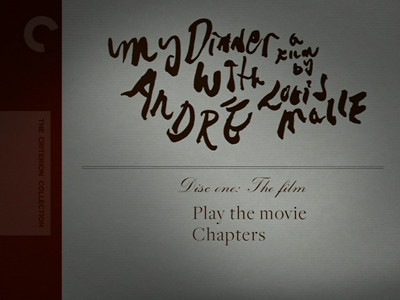
At the end of Waiting for Guffman
My Dinner with André is the brainchild of its two stars, actor/playwright Wallace Shawn and theatre director André Gregory. Of the pair, most moviegoers probably recognize the very recognizable Shawn from his roles in films like The Princess Bride
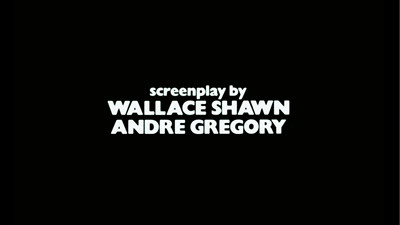
It's one of those left-field concepts that sounds boring but is so very much not boring it's almost shocking. I recall it being a picture that Siskel and Ebert championed back in the day, which is weird because I wasn't even ten when the film came out. Was I really paying attention to those guys back then? I guess so. I suppose it could be a trick of memory, the sort of illusory trap André might call into question in the film, that I could have just heard those famous TV critics talking about it much later. Then again, André would also probably encourage me to get rid of my TV altogether, in which case he would have cut off my cable to spite his own face.
It's weird considering a film like My Dinner with André in 2009, because the cultural landscape has changed so much since Louis Malle set up some cameras and filmed two New York intellectuals debating over a helping of quail. There is an intentional obscuring of the barrier between fiction and reality in this film, like a window that has been washed but the soap streaks are intentionally left on the glass. This is before shows like The Hills and its fake ilk, before reality was packaged and falsified and sold back to us as something genuine as an increasingly standard business practice. When I saw this movie in my late teens, for the first and only time until now, it didn't even occur to me to question whether it was real or not. I assumed it was a true conversation caught on the fly, not a scripted event made to look like it was really happening. I suppose that speaks to how far the film went over my head, that I spent at least twenty years thinking it was a documentary and not a piece of fiction. I suppose, though, that it's a better truth than believing anything that comes out of Heidi Montag's mouth. Even so, the caveats keep rolling; My Dinner with André would probably also reject the notion that any one illusion is quantifiably good in comparison to another.

The film does cover a range of topics, but they all eventually come back around to the concept of self and how one views the world. After a brief intro following Wallace Shawn through New York, listening to his thoughts as he explains the set-up of this dinner, we get into the thick of it relatively quickly. Yet, that set-up also gives us a fundamental understanding of the two character constructs we are working with. Shawn is a playwright concerned with his own failure and how he will make ends meet; André is a successful enough director that he was able to drop out of the business. Even so, there is a sense that he is no longer what he once was, that he is now a failure, as well, and rather than wishing to avoid him because of some social imbalance, Shawn seems scared that his companion might reflect his own insecurities back at him. His failures are Wallace Shawn's failures, too.
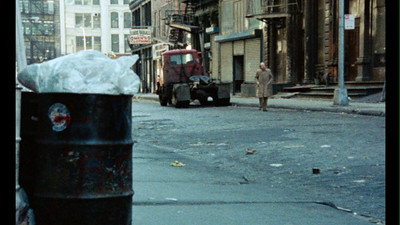
In a very abstract way, there is a case to be made for André representing God and Shawn humanity. André instigates the dinner, and he also begins the conversation with stories of how he learned to manipulate reality and control people through improvisational acting exercises. It is an anecdote that sets the stage both for the topics to follow and introduces the notion, false as it may be, that this is also improvisation. André's example is an event where actors were pushed to play themselves rather than invented characters, just as they are seemingly doing here. Life is performance, so performance is no different than life. Like the anti-Keyser Söze, André's trick here isn't making us believe he's not real when our experience tells us otherwise, but that he is, even when the strings are showing.
As the night wears on, though, André's tales take on an increasing weariness, a despair that all situations can be manipulated and people can't be pushed to act for themselves, as if the Supreme Being were sick of governing the minutia of our nowhere lives. Neither Malle nor the authors really set up any of this divine argument, and to be perfectly honest, it was a total afterthought on my part, but it does have a certain sense to it. André is trying to find a way to be an enlightened being, and he is searching for meaning wherever he can find it, placing great mystical importance on coincidence and his own perceptions of an interconnectedness. Be it art or activity or what have you, people need to come together and create moments of purity, reminding themselves that they are alive by creating illusions that paradoxically will force us to acknowledge that all life is a dream. If everyday experience is lacking in sustenance, then there must be something transformative to free our souls from the existential abyss that is modern living.

It's a self-indulgent argument, and it's hard not to look at André as a self-involved white man of privilege, a position I think the filmmakers are fully aware of. In a way, André is being set up to be knocked down, with Wallace Shawn given very few interjections--acting being reacting, Shawn doesn't sit idly, the amount of listening may make his the more difficult performance. Most of his thoughts are saved until his cathartic third-act speech (right on cue, right when it's needed*) in defense of day-to-day living, of the importance of surviving and the strength of the individual and the few real bonds one makes. This is enough, this is important, life is in the details. In a way, this, and the fact that My Dinner with André exists at all, supports Shawn's earlier argument that art should reflect life and the common experience; yet, it also supports André, who says that people know enough of their own lives and don't need to see their personal dramas played out for them on stage or screen, they need something else to transport them.
Which is just what My Dinner with André does for its running time. For nearly two hours you are likely to forget whatever else is around you, what bills aren't paid or that you need to put your laundry in the dryer, because you'll be wrapped up in this conversation. It may not be as important as André would have us believe, that this entertainment, no matter how intellectually stimulating, is merely a distraction from our own mortality, but each of the men does end up proving that art can be what he wants it to be without canceling out the other. Being both a reflection and a distortion, it can show us our personal reality while also showing us a different one; we see ourselves in what is separate from us. It may only be a magic trick, but it provides succor via entertainment, while also changing one's frame of reference and, therefore, one's perception. At one point, André asks if maybe the only art that will work anymore is the art that is geared toward an audience of one. Though this was still true in a darkened Cineplex, where each audience member sat alone with his or her thoughts and these two dinner guests, it's now even more valid in the age of DVD. And yet, that once very public private act of going to the movies was still communal in that a group of people engaged in it at the same time; are we now more disconnected as we enjoy more and more of life in the confines of our own homes? Does it make us better or less equipped to replicate the unheralded victory that sneaks its way into the voiceover at the end, when Wallace Shawn informs us that he goes home and tells his girlfriend all about his meal? He carries the torch for the conversation and passes it to someone else. I guess our new challenge is to get out of our easy chairs and do the same.
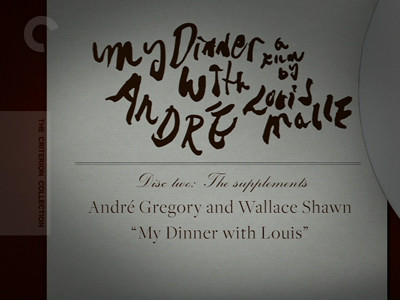
For those who want to go behind the curtain and learn more about how the reality informed the film and how Malle, Shawn, and Gregory built a piece of fiction out of actual lives, the lead feature on DVD 2 should satisfy your concerns. Filmmaker Noah Baumbach (The Squid and the Whale
The tables--and the camera--are turned in the other program, a 1982 episode of the BBC magazine show "Arena." Titled "My Dinner with Louis," it's a 52-minute portrait of Malle, based around an interview conducted by Wallace Shawn. The full scope of Malle's movie career is explored, complete with clips, in an attempt to divine the director's artistic impulse and the themes of his work. It's a great insight into the man who would read the script for My Dinner with André and think, "This is a movie I have to make."
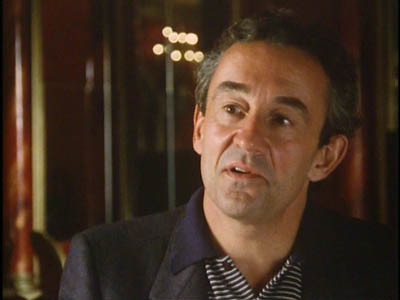
Louis Malle
* Though, arguably, it's actually a second-act shift, this not being a by-the-book third act film. (I can hear Charlie Kaufman in my head, "Don't say ‘third act.'")
For a full rundown on the special features, read the full article at DVD Talk.

1 comment:
Post a Comment